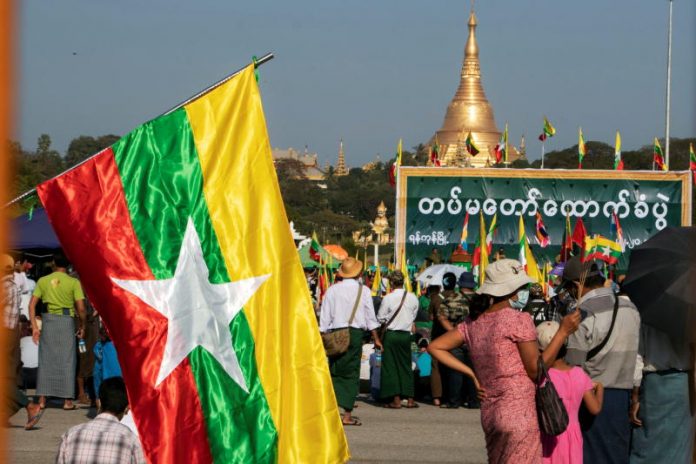ASEAN member states have been closely following developments in Myanmar following the military coup there.
Tuesday’s statement said, “We recall the purposes and the principles enshrined in the ASEAN Charter, including the adherence to the principles of democracy, the rule of law and good governance, respect for and protection of human rights and fundamental freedoms”.
“We reiterate that political stability in ASEAN member states is essential to achieving a peaceful, stable and prosperous ASEAN Community”.
“We encourage the pursuance of dialogue, reconciliation and the return to normalcy in accordance with the will and interests of the people of Myanmar.”
Prime Minister Prayut Chan-o-cha commented on Thailand’s stance on the coup, saying it was important for ASEAN nations to take a collective stand.
“I want news reports to be presented carefully to avoid any impacts on the economic benefits,” Gen Chan-o-cha said.
“We are neighbouring countries. We also need to listen to ASEAN’s stance. I don’t want any conflict to escalate, particularly in Thailand.”
The premier then addressed fears that the coup might affect development projects in the Dawei Special Economic Zone (DSEZ), which is a joint venture between Japan, Myanmar and Thailand.
He said he had instructed a committee led by Finance Minister Arkhom Termpittayapaisith to hold talks with all involved to find ways to help Thai investors.
Surakiart Sathirathai, Chairman of the Asian Peace and Reconciliation Council, said considerable concern had been expressed over the coup. “We all wish to see peace and stability prevail in Myanmar,” he said.
“The country is continuing the great strides it has made on the path to democracy but, while respecting the internal affairs of Myanmar, we would like to appeal for the release of Daw Aung San Suu Kyi and those currently in detention.”
Mr Sathirathai, a former foreign minister, said all sides should engage in peaceful dialogue to resolve the situation while upholding the principles of democracy and rule of law as enshrined in the Constitution of Myanmar.
Col Samrit Chatwattanasakul, commander of a task force of the 3rd Cavalry Regiment in Chiang Rai, said on Tuesday the prime minister had instructed authorities to forbid any groups from staging political activities along the Thai-Myanmar border.
The PM was concerned that such activities would affect national security and relations with Myanmar, Col Chatwattanasakul said.
He added that the task force had increased its presence from 900 to 1,100 soldiers in Chiang Rai’s Mae Sai district, which borders Myanmar’s Tachileik. CCTV cameras had also been installed to prevent illegal entry across the border via natural crossings.
Deputy national police chief Pol Gen Damrongsak Kittiprapas said he had also told immigration officers to closely monitor movements along the Thai-Myanmar border following the military coup.
Border checkpoints remain open for transporting goods, he said, adding that police are already prepared for Thais who wanted to return from Myanmar, with facilities arranged to quarantine them for 14 days.
In Bangkok, police have also come up with security arrangements around the Myanmar embassy following Monday’s rally in front of the building in Sathon Road, Pol Gen Kittiprapas said.
Police broke up the rally as enraged Myanmar citizens demanded the immediate release of the country’s de facto leader Aung San Suu Kyi and other democratically elected politicians.
Observers said 200 people gathered in front of the embassy, supported by about 20 Thai protesters, including Parit “Penguin” Chiwarak, Chinawat Jankrajang, Panusaya “Rung” Sithijirawattanakul and Piyarat “Toto” Chongthep.
Pol Gen Kittiprapas warned that any rallies should not be held during the second wave of COVID-19, adding that Bangkok had been designated a maximum disease control zone.
Any Myanmar nationals who wanted to air grievances should do so through proper channels, he said.

Visit Chiang Mai One For The Latest News




